By Anna Kragie — May 22, 2024

The 2024 CPPO Symposium covered every corner of payments innovation — financial inclusion, open banking, AI, fraud and security, bank-fintech partnerships, fintech-SMB lending, just to name a few. We also addressed how to address these topics in an ever-changing regulatory environment.
“The promise of payments innovation is to create more convenient, efficient, secure, and inclusive payment methods that enhance the overall financial experience. And we are here to examine our progress from the lens of all stakeholders in the ecosystem – consumers, small business, merchants, banks,” Jennifer Tramontana, CPPO Executive Director Jennifer Tramontana said during her opening remarks.
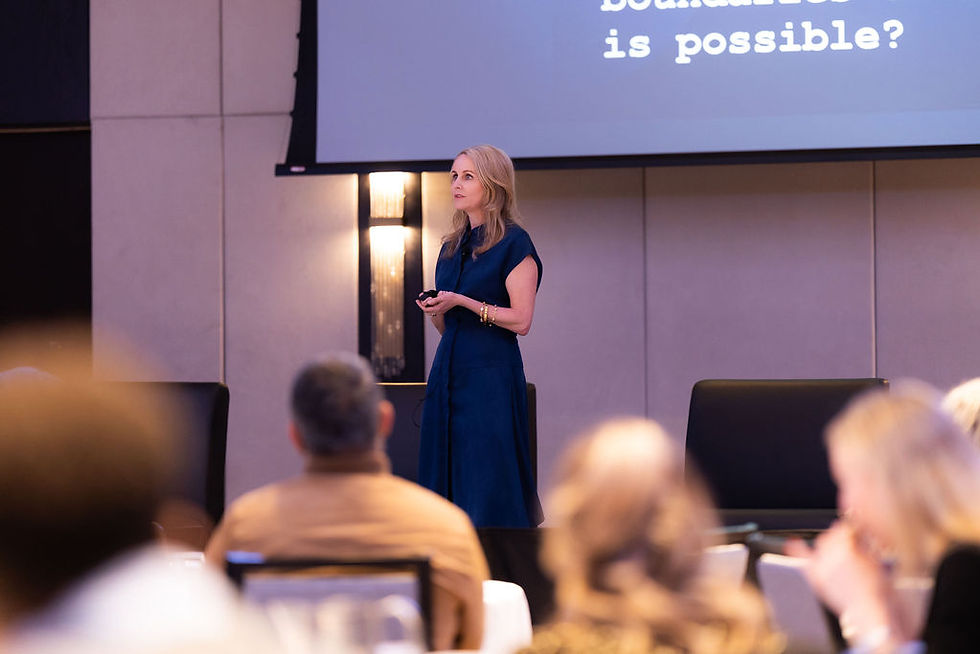
The Symposium panels dove into what it's going to take to enable the types of financial services that support prepaid’s vision of driving improvements in payments convenience, value and inclusivity.
The regulatory conversations included government officials from the Bank of Canada and the Canadian Deposit Insurance Corporation (CDIC) and Payments Canada and explored consumer driven banking, retail payments oversight, and how regulatory agencies are responding to the next wave of innovation in the payments space.
To kick off the day, our first panel was energized with pointed conversations about what digital natives like KOHO, Wealthsimple, EQ Bank and Neo Financial are doing to pick up where the 'Big 6' left off.
We dove into how prepaid as a platform is an innovation engine, while also helping fill the gaps. We talked about where more work needs to be done, and how the industry can collaborate to create improvements in payments convenience, value and inclusivity for consumers, SMBs and governments.

We brought together government officials, including Annie Hardy, Director, Fintech Relations & Third-Party Disclosure from Canada Deposit Insurance Corporation (CDIC), Nikil Chande, Senior Director, Registration & Enforcement, Retail Payment Supervision from the Bank of Canada and Kirsten Fraser, Director at Finance Canada to talk with Tracy Molino, counsel at Blake, Cassels & Graydon LLP about how regulatory agencies are responding to the next wave of payments innovation.
We got new updates in our Innovation Lounge from Mastercard, Peoples Group, Giesecke+Devrient, Digital Commerce Group, Onbe, EQ Bank, REV Prepaid and CDIC
The Symposium dove into the state of AI, payments risk, security and compliance and what it means for protecting your digital identity during a chat with Mastercard, Giesecke+Devrient and eSentire.

We unveiled brand new research showing the development of and use cases for the open-loop prepaid market from Datos Insights (more on that soon!)

We had a passionate panel with Peoples Group, Airwallex, EML and Vault on what can be done between bank-fintech partnerships to create improvements in payments as an open banking framework lags in Canada — discussing which markets Canada should take a page from.
We dove into how the customer journey is evolving as payments get embedded deeper into the customer shopping experience and how this is impacting how brands interact with consumers and gain their loyalty in a discussion with Onbe, Square, Sezzle and Collinson.
We then wrapped our day discussing how consumer experiences can be replicated in an SMB banking environment during a chat with Visa, Notch, Loop Financial and Peoples Group.
Catch a few highlights from each panel below:
Mastercard Keynote + Fireside Chat with H&R Block: Prepaid’s Expanding Use Cases

We kicked off the Symposium exploring prepaid’s role in the digital payments ecosystem. During a keynote by Darrell MacMullin, Senior Vice President - Product and Solutions at Mastercard Canada, he shared insights on the modernization of payments and what role prepaid is playing.
“As technology continues to rapidly advance, the physical, digital, and virtual worlds will continue to blend, leading to hyper-personalized, tech-enabled commerce experiences,” MacMullin said. “The evolution towards a digital first society has accelerated rapidly over the past five years – with prepaid cards growing by 19% in volume alone."
He spoke about the rise in prepaid popularity for younger consumers, as parents leverage open-loop cards to provide an allowance or to track spending. He highlighted the value of prepaid as a way to quickly and easily manage money, with apps that give consumers insights and budgeting tools to boost financial literacy.
He spoke toward the value prepaid is giving businesses, merchants, government entities, banks, and others new ways to provide financial services that are flexible, customizable, and digital in nature. Pointing toward Mastercard’s research, he highlighted what it says about what people want: cashback rewards, cards without annual fees, and technological alternatives to their traditional banks.
“Prepaid can help build credit for those who need it. It can allow businesses to offer loyalty rewards like cash back to customers who can’t currently access them. ….Canadians now have access to their money in, again, a secure format that allows them to use it right away. Prepaid is a powerful tool when it comes to inclusion,” MacMullin said.
Following his keynote, he invited James Klassen, Director, Products & Services at H&R Block Canada on stage for a fireside chat. They spoke about use cases that are gaining popularity in Canada, including Canadians who filed their tax returns through H&R Block and had the option of receiving their tax refund via a prepaid Mastercard.
James spoke about how the market can advance by boosting access to virtual cards and digital wallets. And, by using prepaid to drive loyalty and as a tool to reach more audiences through digitization, particularly gig workers and small business owners. Recognizing the uncertain future of open banking and real-time rails in Canada, James said there’s immense opportunity ahead for the prepaid industry to support people and businesses’ financial needs easier and faster.
“What we are seeing that customers don’t care so much about how they are going to send money. They just want to do something that’s easy, fast and transparent,” Klassen said. “Being able to meet customers where they are and do things that they want do is important. We can’t get so hung up on the technology itself …Being able to provide things at speed and at scale matters. …They don’t want to worry about how they are getting paid.”
What’s New with the Neo Banks?
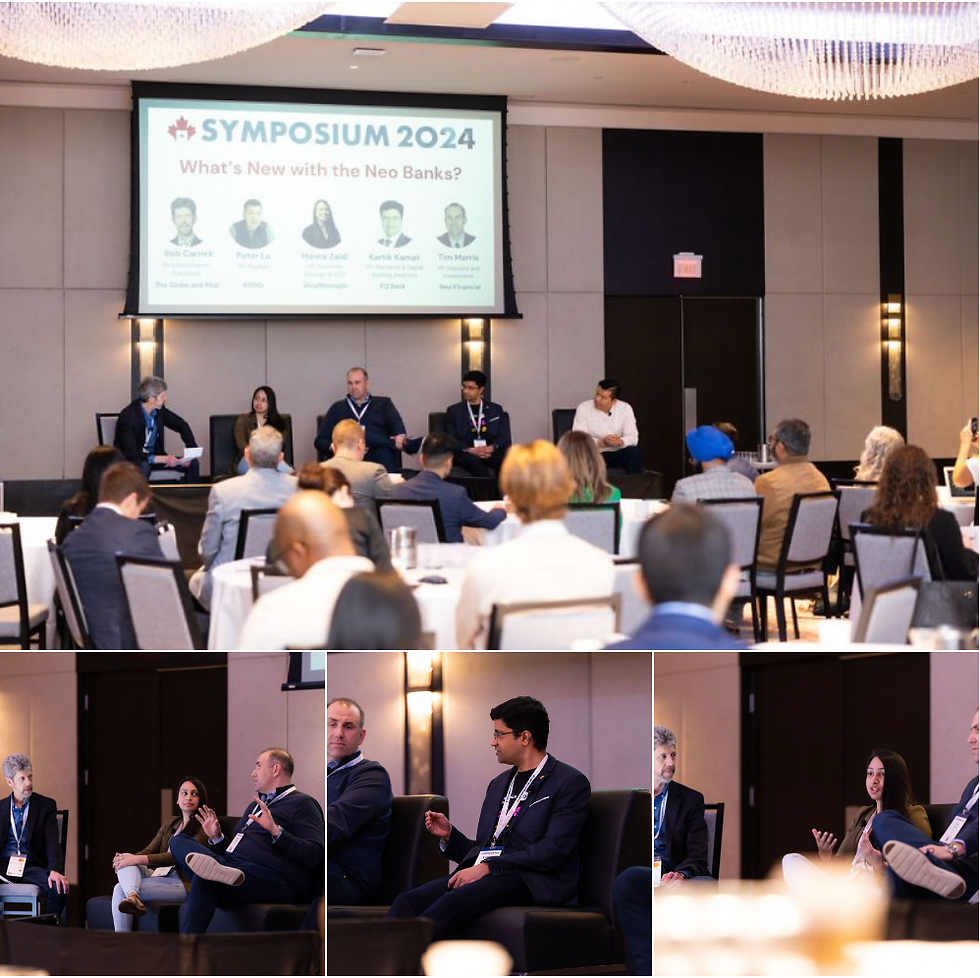
Led by Rob Carrick, personal finance columnist for the Globe and Mail, this panel explored explored how the digital natives are growing as consumers look for more consumer-friendly financial services that meet their specific needs.
Panelists:
Peter Lu, VP, Product, KOHO
Hanna Zaidi, VP, Payments Strategy & CCO, Wealthsimple
Kartik Kamat, VP, Payments & Digital Banking Analytics, EQ Bank
Tim Morris, VP, Deposits and Investments, Neo Financial
The Canadian neobank panelists agreed that while the prepaid name may need a facelift, what prepaid is doing behind the scenes to support payments innovation is making a difference in the digital money movement. The group also agreed: pressure needs to be put on the 'Big 6' to give consumers and businesses better, faster and more affordable access to their own money. Few takeaways:
There needs to be a greater focus on high value, low cost payments so Canadians feel they are getting more out of their financial relationships. We’re not seeing an inflection point yet.
You’re going to see a lot more market entrants and a lot more momentum. People don’t feel like they have influence over their finances with their bank. We have to put that power back in their hands.
The underbanked is still a huge opportunity. We need to make people’s money work for them. People need a second chance in opening their first bank account. There also needs to be a reduction in customer fees.
Banks aren’t changing fast enough. They need to be pressured to change their pricing structure. There needs to be more momentum and competitive pressure for banks to help consumers.
Visa Keynote + Fireside Chat with Mydoh: Prepaid Innovation Around the World: Trends, Opportunities and Threats

Starting with a presentation by Kimathi Marangu, Global Head of Prepaid at Visa, this session will be followed by a fireside chat between Kimathi and Arvind Agarwal, Head of Payments and Platform at Mydoh, a money management app for families, backed by RBC.
Marangu spoke about how consumers are multi-banked and get prepaid cards through fintech apps and digital wallets when not offered by their FI. He stressed the need to educate consumers—focusing less on the name, and more on the value: “It’s more about solving the problem for consumers. We all care about how we are going to deliver it. The ‘how’ is where prepaid comes into play.”
He shared insights on the growing number of digital consumer use cases for GPR prepaid, like budgeting, security and paying people. Marangu also shared what Visa’s research shows about what consumers like about prepaid: easy sign up, easily loaded, easy to budget/set aside money with and the security. The research also recognized what barriers exist: the perceived lack of acceptance, not knowing how it works and trouble navigating the e-load process.
Marangu also talked about what makes a successful GPR prepaid program: Being able to check a card balance online or via app; getting in-app or push notifications about balance updates or security issues; having in-app card controls, easy reload capabilities, the ability to transfer money from accounts at a POS or ATM, and being able to locate in-network ATMs (not just for getting cash, but as a service for branchless consumers).
Following his keynote, Agarwal joined on stage for a fireside chat to share how prepaid’s digital future is coming to life in new ways through new audiences: “Mydoh is more than just a financial management app for families, it’s a tool for change — we equip kids with the knowledge and values derived from real experience with real money.”
The Security Imperative. Will AI Enhance Security or Just Drive More Fraud?
The panel discussed the implications for payments and commerce innovation — including its potential to strengthen customer engagement, create more efficient business operations, support software development and much more.
They also spoke about how businesses must adapt with today's cyber risks. For instance, by using predictive AI tools with risk scores that can adapt with the risk models. Then, there's generative AI, which fraudsters are using as much as anyone else, particularly to replicate human expression and produce human-sounding content.
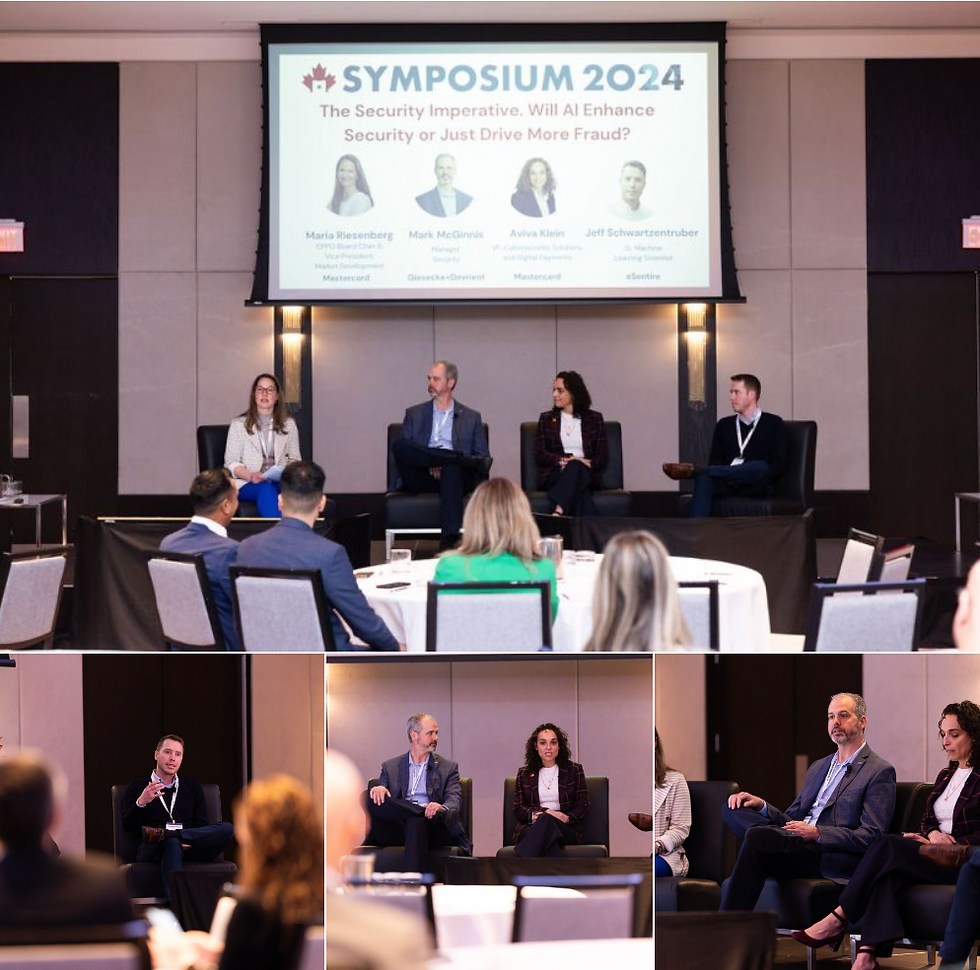
Moderator: Maria Riesenberg, Vice President Market Development, Mastercard and CPPO Board Chair
Panelists:
Mark McGinnis, Manager, Security, Giesecke+Devrient
Aviva Klein, Vice President of Cybersecurity Solutions & Digital Payments, Mastercard
Jeff Schwartzentruber, Sr. Machine Learning Scientist, eSentire
A few highlights from the conversations:
The tech developments that are advancing the payments industry forward are also the same types of developments that fraudsters are leveraging to perpetrate fraud.
Fraudsters are targeting small businesses to get access to larger businesses. Anyone who is looking to perpetrate large businesses, or the government, are looking to small businesses as their back door. It’s not an IT risk anymore; it’s a business risk.
There are efficiency gains that have evolved from large language models (LLMs) to generative AI – but the attackers are leveraging it more than us. They are seeing those same efficiencies, and they are seeing the advantages more.
Innovation in the Absence of Open Banking
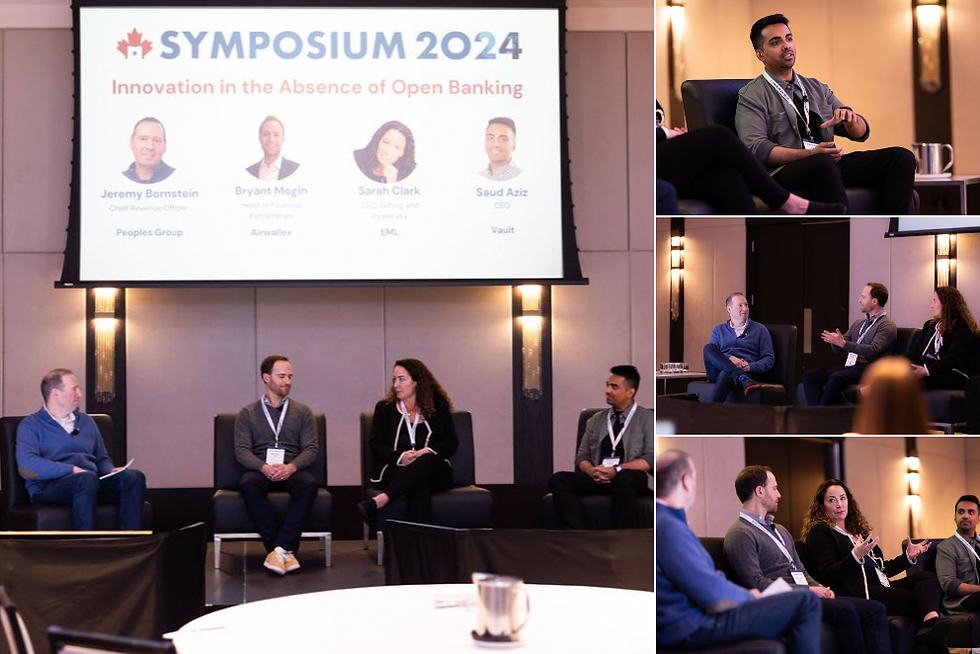
Moderator: Jeremy Bornstein, Chief Revenue Officer, Peoples Group
Panelists:
Bryant Mogin, Director, Head of Financial Partnerships, Airwallex
Sarah Clark, CEO of Gifting and Incentives, EML
Saud Aziz, CEO, Vault
During the Symposium, we heard from industry leaders about one topic everyone in Canadian financial services is talking about: Open Banking. Panelists talked about what needs to happen to drive innovation forward to solve consumer and business payment pain points.
The discussion dove into how other markets compare, and where Canada faces significant gaps. The candid conversations pointed to how Canada is not keeping pace with payments innovation in the G7 and beyond.
One takeaway: Digital delivery and real-time/instant issuance is becoming table stakes. Prepaid is enabling new use cases for both consumer and business payments for achieving better, faster, inclusive, secure digital payments. But these use cases need to be adopted by the Canadian government so people can send and receive money faster, digitally, and on their terms.
Few highlights:
If Canada wants to look at what’s coming next, it needs to look at Europe. Open Banking has been in the UK for seven years.
Innovation isn’t about how we make things faster. It’s about how we make them better in a way that protects consumers and businesses.
Open banking is really about data, and how people access their data. But there’s still so much lack of clarity of what that looks like from the regulatory side.
Blurring the Lines Between Banking, Retailing and the Optimized Customer Journey
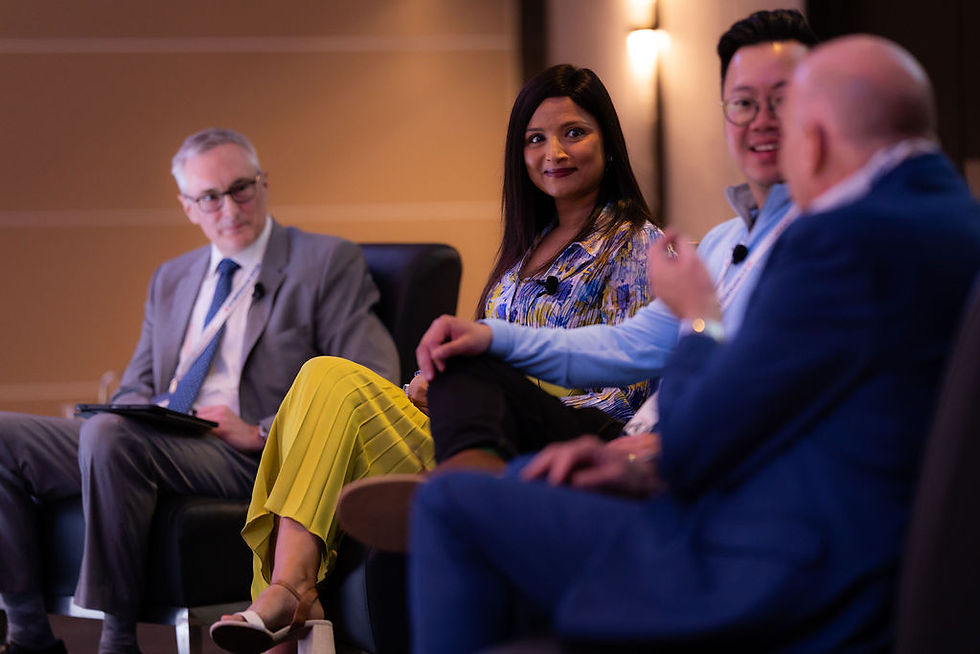
The final two panels at the Symposium, including one that dove into optimizing the customer journey as what it means to bank, shop and pay evolves. This included many questions the industry is racing to solve for.
While payments are getting embedded deeper into the customer shopping experience, is friction always being removed along the way? What friction needs to exist to deliver a positive payment experience, while still safeguarding the payment credentials? How does this impact how brands interact with consumers as they work to gain their loyalty?
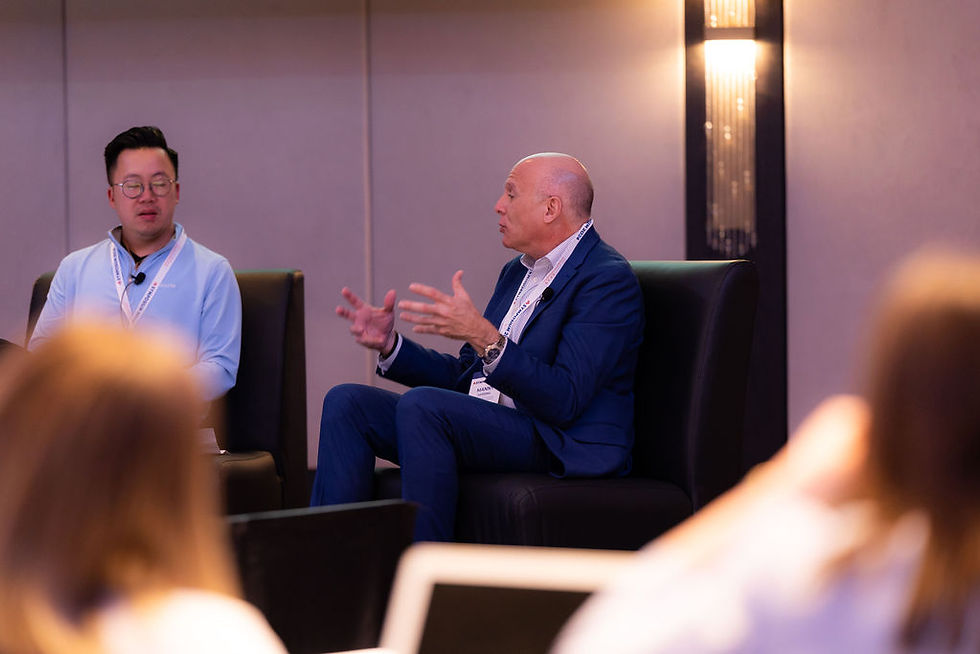
During that session, panelists spoke about the intersection of payments, incentives and retail tech and how to merge those together in a way that gives customers the type of digital commerce experiences they expect.
Moderator: Ed Woodson, Chief Legal Officer, Onbe
Panelists:
Anusha Ramanujam, Global Head of Payment Partnerships & Product Enablement, Square
Patrick Chan, General Manager, Sezzle
Manuel Catedral, VP Business Development, Collinson
Small Business Fintech: Bringing the Best of Consumer Experiences to SMB Banking

Moderator: Chris Ferron, Head of Digital Partnerships & Fintech, Visa Canada
Panelists:
Ivy Luu, Head of Payments, Notch
Cato Pastoll, CEO & Co-founder, Loop Financial
Daniela Chiasson, VP of Business Development, Peoples Group
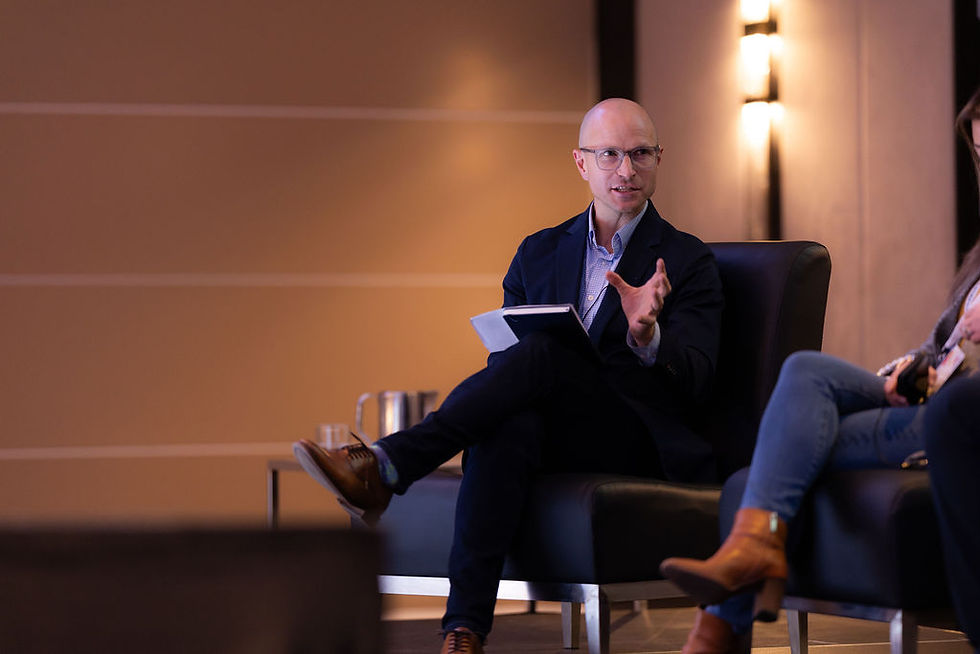
As the lifeblood of the economy, small businesses contribute roughly 51% to Canada’s GDP. They also account for 60-80% of all jobs created in Canada. This panel features a discussion with Canadian fintechs in the SMB space about serving the underserved in a market that’s primarily banked, and how they are bringing consumer experiences to SMB banking. This panel dove into what can be done to prioritize this market and continue meeting small business' needs.

Panelists dove into the key question that will continue to evolve as new products and services come to market: how can we continue making payments easier, faster, more secure, more cost-effective for businesses and the customers they serve?
They covered new use cases for BNPL, embedded payments, SMB payments and what needs to be done to continue making these processes more seamless for everyone in the payments value chain.


Comentarios